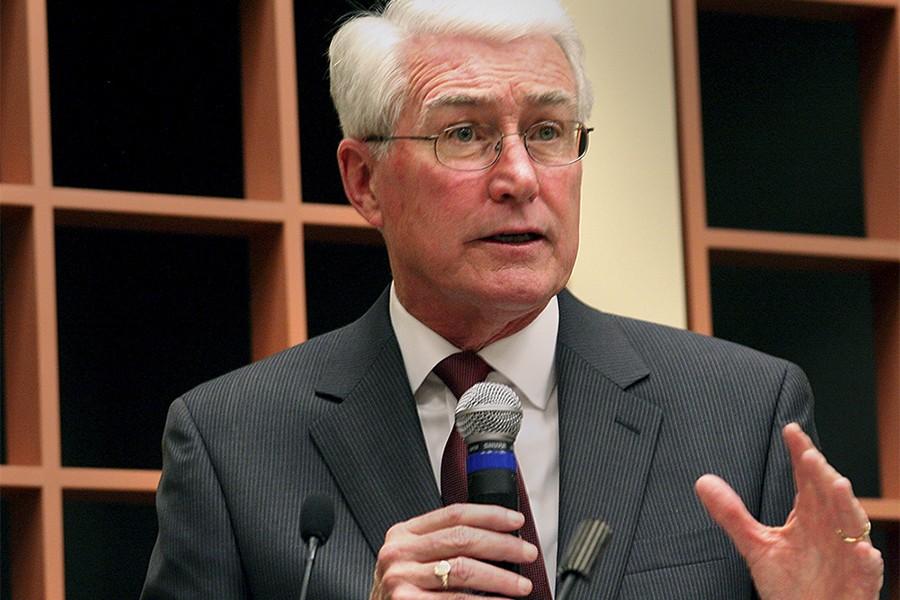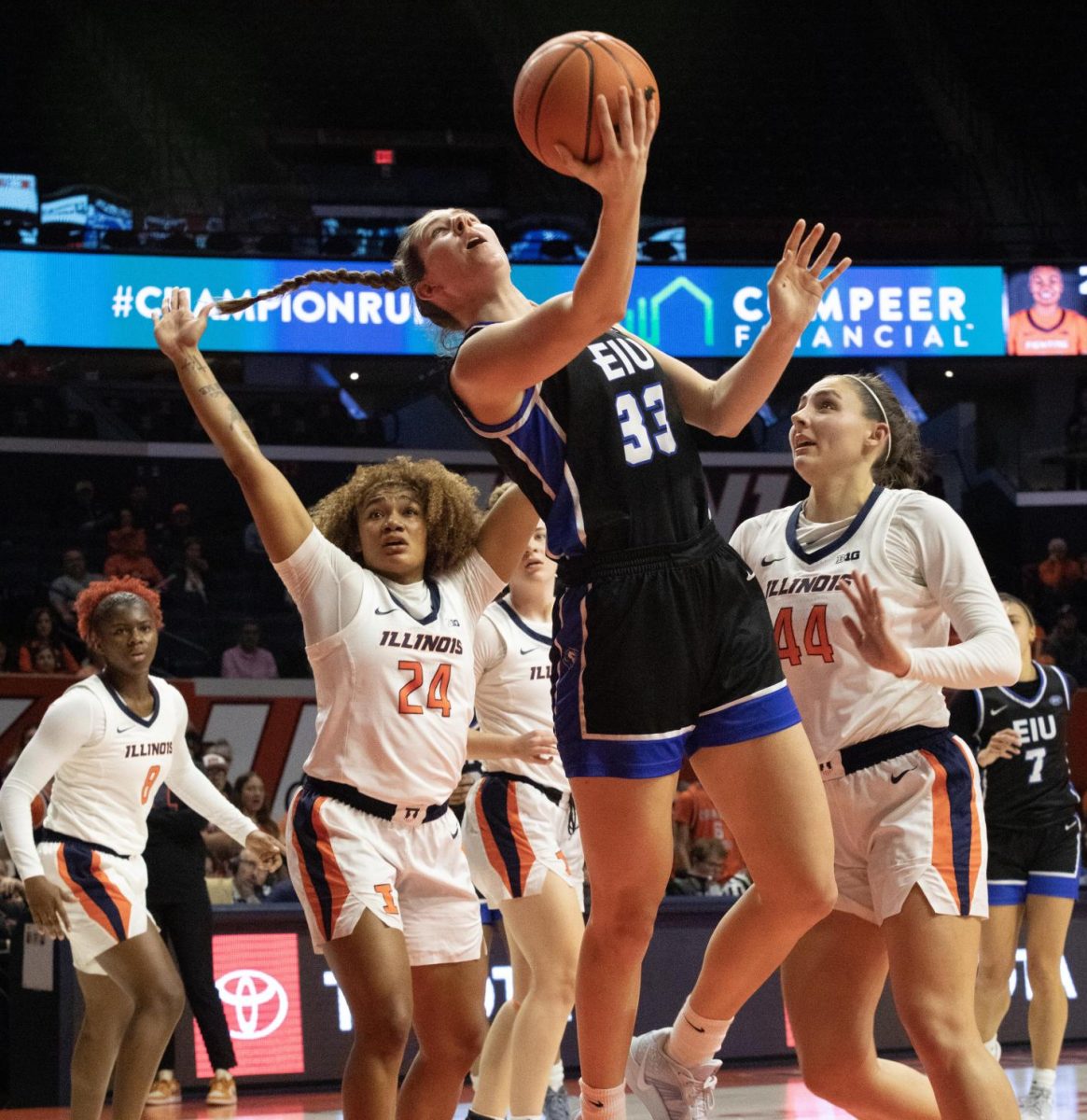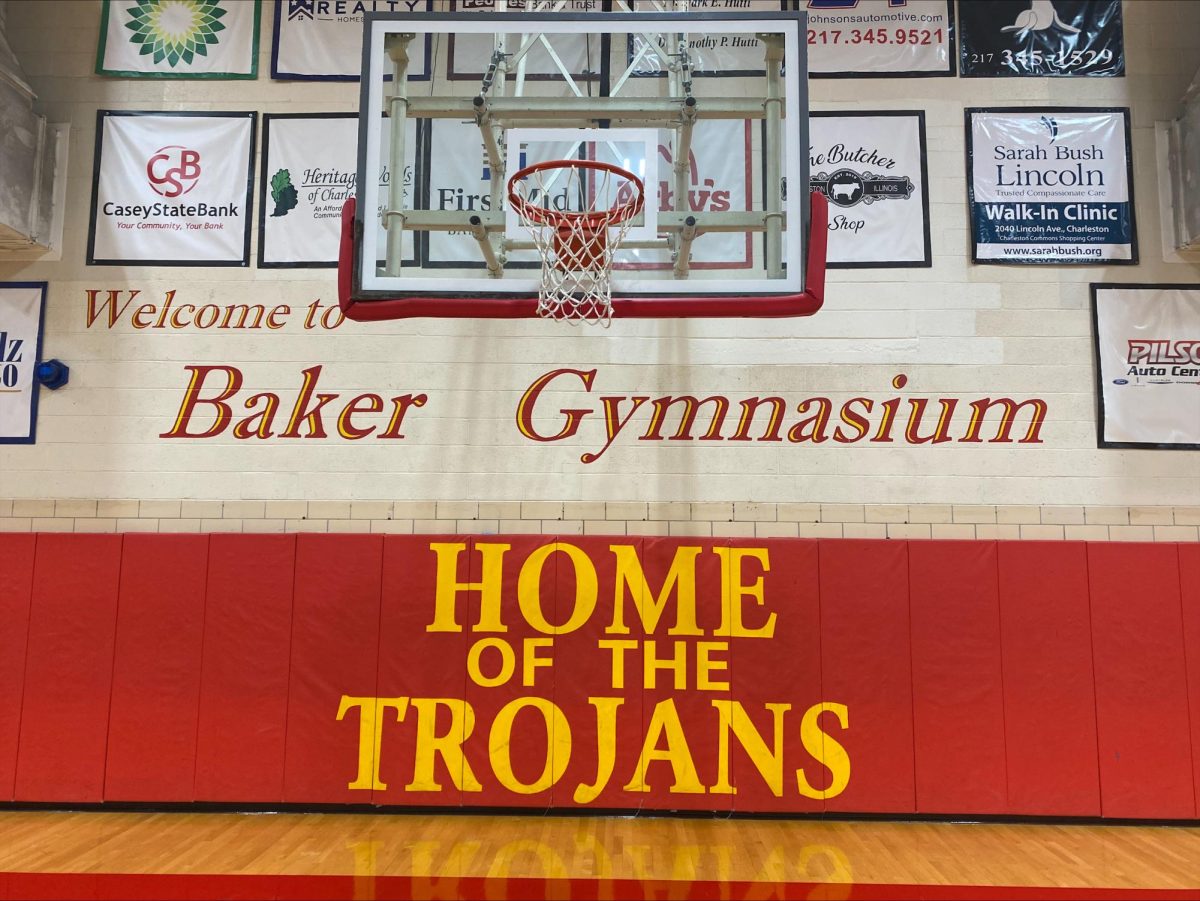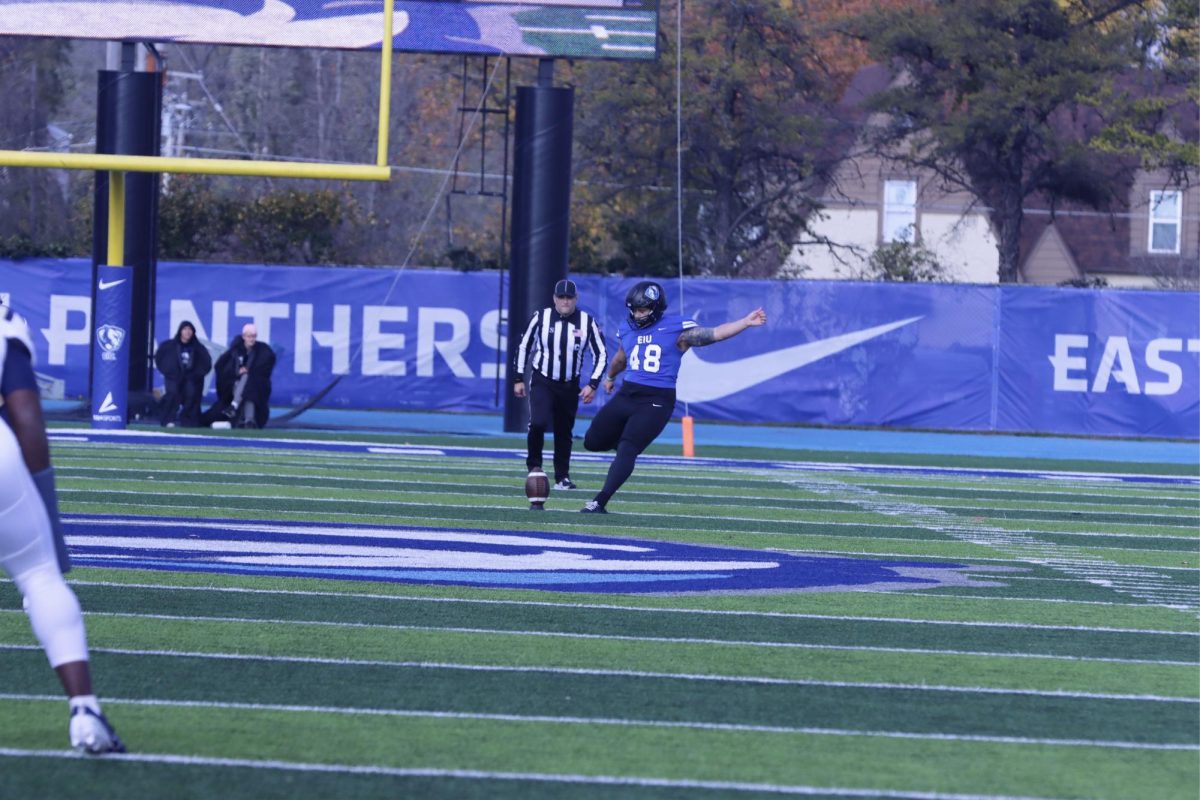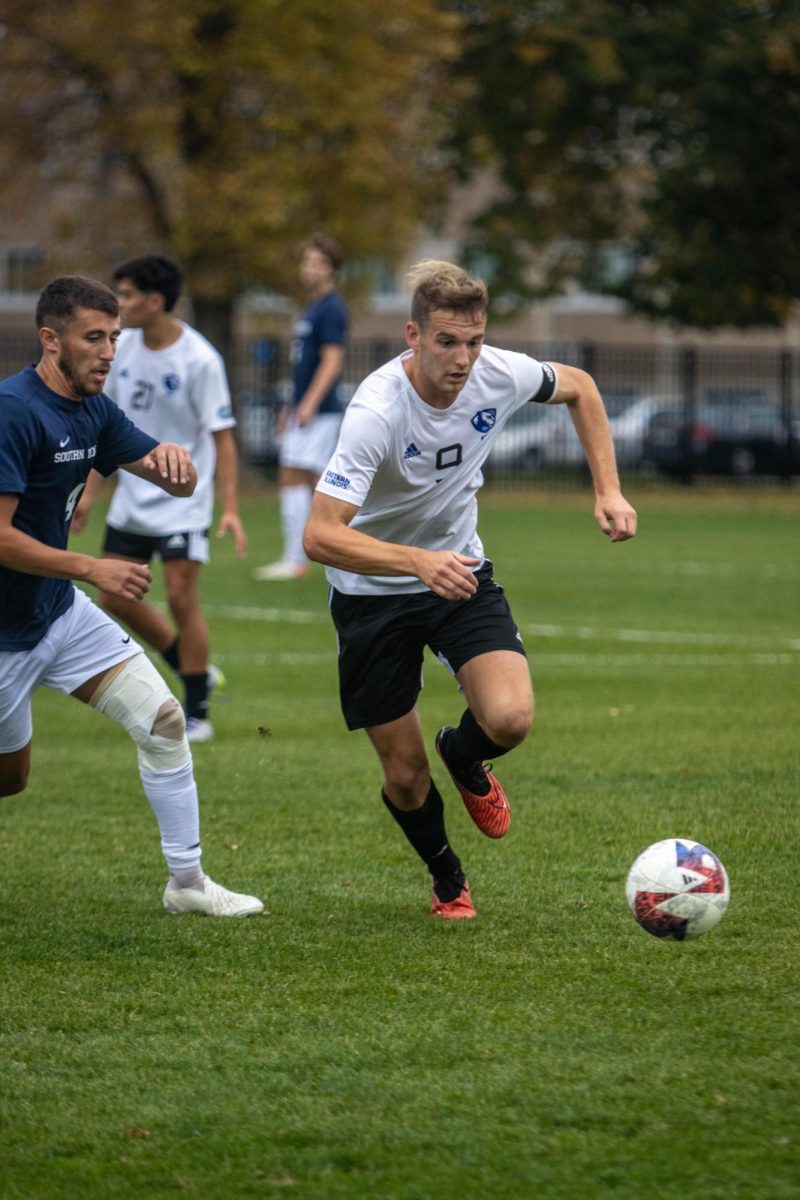No money available; cut projects could result
If the 2.5 percent budget cut that Gov. Rod Blagojevich has requested of public higher education institutions were passed, Eastern’s maintenance and utilities would face cuts.
“I hate to see that because that’s one of the things we continue to struggle with here is our deferred maintenance, which is a backlog of projects that we haven’t been able to get to,” said Jeff Cooley, vice president of business affairs. “So any time we start to make cuts, it’s simply going to exacerbate that problem.”
Cooley said when the university starts delaying maintenance issues to cut costs, the backlog on the deferred maintenance increases more.
In fiscal year 2007, the accumulation of deferred maintenance was estimated at $91.9 million.
President Perry outlined in an e-mail to the campus community on Nov. 20 a list of tentative reductions the university would face if legislation had passed for an 8 percent budget cut.
The e-mail listed a reduction of non-safety related maintenance and reduction of utility expenditures as two of six possible cuts.
The 8 percent legislation is no longer under discussion. Perry’s list of tentative reductions will be looked at for the possible 2.5 percent cut.
Eastern was notified on Nov. 26 that Gov. Blagojevich had requested a 2.5 percent reserve on appropriations for public higher education institutions and agencies.
Gary Reed, director of facilities planning and management, said there are baseline needs that can not be reduced.
“We’ve got to keep the lights on,” Reed said. “We have to keep the buildings operating.”
Reed said the president’s focus is to take a look at only the safety-related maintenance.
“He’s not talking about the operating piece of maintenance, perhaps he’s asking us to take a good look at projects that could be delayed if need be,” Reed said.
Only safety-related items
Cooley said not all maintenances would be discontinued.
He said certain safety-related deferred maintenance items would need to continue to be addressed.
“We’re prioritizing what those reductions and cutbacks might be,” Cooley said.
An example of a maintenance item that could be deferred is masonry on a building that needs repaired to prevent water from coming in, he said.
Sidewalk repairs and painting, Cooley said, are other examples of something that could be deferred.
Safety-related maintenance items that would need to continue to be addressed would include trip hazards on the sidewalks or a handrail that needs replaced, Cooley said.
“Anything that relates to environmental, bodily health and safety we would go ahead and try and get those projects done,” he said.
Cooley said if reductions did need to be made, it would be on maintenance items like window replacement.
“That window is not going to be repaired for a period of time,” he said. “Now, is that drafty? Well, perhaps. Is that ugly? Yes. So those are the kinds of things that we’ll have to put up with a little bit longer.”
Deferring some maintenance projects could impact comfort, Cooley said.
A drafty window or a faulty radiator could be put off affecting occupant comfort.
Cooley said at this time he is not sure how much maintenance would need to be reduced.
He said the university is still looking at the different scenarios of each of Perry’s tentative reductions.
“We really don’t know the magnitudes of any one of those particular items at this point in time,” Cooley said.
No available money
Reed said anything planned at the beginning of the year is already encumbered and tied up in a contract.
“The cancellation of a contract of this sort is impossible this late in the game,” he said.
Reed said facilities planning and management will continue to keep moving with projects, but if something comes up, the university will first take a look at the need of the request.
He said if the request is not critical to the operations and maintaining good campus facilities then it will be rescheduled for a later time.
Facilities planning and management receives a base allocation annually for deferred maintenance to be applied to projects at the beginning of each fiscal year.
This money is tied up right now contractually, Reed said.
“By this late in the fiscal cycle, those moneys are pretty well tied up in contracts,” he said. “There’s not a whole lot of wiggle room.”
By mid-year, Reed said the contracts are on board and the projects are moving forward.
“As far as any available funding, that is not possible at this time with those contracts,” he said.
Reed said as far as cutbacks go, Perry’s focus on the non-safety related maintenance will refer to projects that come up over time, such as a renovation requests.
If the request is not a safety-related request then it will become a deferred item, he said.
“That’s how we’re reading that, and we’ll certainly comply with what the president wants us to do here,” Reed said.
Reed said right now he has no available funding or money.
If the 2.5 percent of the budget was asked to be returned, facilities planning and management could be asked to take the next step and cancel contracts that are currently in process if possible.
“If we’re directed to do so, but there would be a cost associated with canceling projects at this phase and consequences that would have to be considered,” Reed said.
He said the university is removing rooftop air conditioning systems from areas that are in dire needs for upgrades, which has been planned for many years.
The math classrooms in Old Main have been in poor repair for 10 years at least, Reed said.
This project finally came up in the deferred maintenance planning, Reed said. The Board of Trustees approved the contract, the university awarded the contract and now the project is in process of mobilizing work.
The first step is to decommission the existing system.
“Once you commit to decommissioning the current air conditioning system and pulling it off the roof, you have to proceed with it or there won’t be no air conditioning next summer,” Reed said.
He said this is an example of consequences that could result if a project was halted.
“Several projects that are in play right now, that we have committed to get done this year, could be stopped if the administration so chose to do that, but there are consequences and it could be costly and you might lose some services that you need next summer,” Reed said.
The costs associated with canceling a contract depends on the project.
If contractors have materials already ordered, they would have to cancel their orders, which would result in a restocking charge on the part of the contractor.
Contractors may have made commitments for labor and delaying a project may result in delay charges.
“We know times are tough,” Reed said. “Economic times are tough. We do not just have money. You can see by the deferred maintenance, we’re seriously under funded on our deferred maintenance appropriation anyway. Every dollar we get is wisely planned and well spent. It isn’t like there’s a lot of available dollars in our critical that can be just taken away at any time.”
Far exceeding the funding
Reed said he has a five-year plan of deferred maintenance that far exceeds its funding level.
“We have a tremendous backlog of deferred maintenance already, (a budget cut) is just asking us to further add to the deferred maintenance backlog that we already have,” he said.
With already more than $90 million of deferred maintenance needs, the deferred maintenance increases at a regular pace each year at about 1.5 percent because the university does not receive the funds it needs.
Reed said in these situations, rather than keep infrastructure and building conditions where the university would like to have them, Eastern is instead forced to continue to defer and accumulate additional deferred maintenance.
“We may not be able to replace a roof when it’s time,” Reed said. “We may just have to continue to patch it. We may not be able to replace an air conditioning chiller when it needs to be replaced. We may just keep throwing in repairs and be in a reactive repair mode.”
Emily Zulz can be reached at 581-7942 or at eazulz@eiu.edu.




